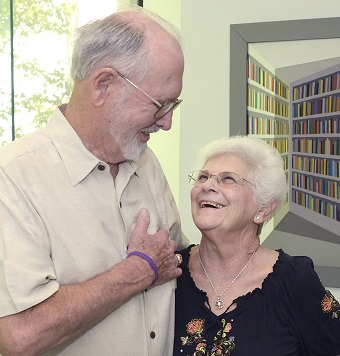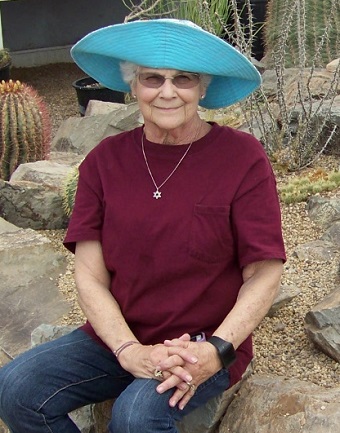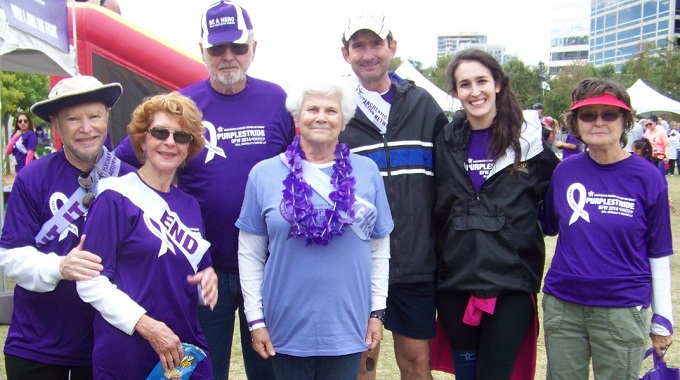Calvert legacy gift supports pancreatic cancer programs

Ray Calvert is grateful for 41 wonderful years of marriage to the love of his life, Paula.
By Sharon Reynolds
After enduring several months of persistent stomach pain, Paula Calvert received a devastating diagnosis of inoperable stage 4 pancreatic cancer on March 3, 2011. Because of the cancer’s late stage, she was told that chemotherapy was her only treatment option that would give her just a few months to live.
Mrs. Calvert was stunned and immediately began a search for a second opinion. She came to UT Southwestern and found hope in oncologist, Dr. Udit Verma, Associate Professor, Internal Medicine in Hematology/Oncology, and his team of cancer specialists. Dr. Verma put together a treatment plan that included chemotherapy to stop the spread of cancer and radiation to shrink the tumor. Mrs. Calvert then had the tumor surgically removed and enrolled in a clinical trial that used her body’s own immune system to help fight the remaining cancer cells in her body.
Pancreatic cancer is one of the most challenging malignancies to detect and treat, and only a small number – 8.2 percent of patients – reach the five-year survival rate after diagnosis. Five years after her diagnosis, there was no evidence of disease in Mrs. Calvert’s body.
“My UT Southwestern oncologist and I both strongly believe the trial vaccine played a big part in keeping me free from the spread or recurrence of cancer,” she said at the time. “I am happy to be alive and try to enjoy each and every day.”
The Calverts were grateful for the precious time afforded them under Dr. Verma’s care. In 2014, they established the H. Ray and Paula Calvert Fund in Gastroenterology Oncology in honor of Udit Verma, M.D. with a gift of $100,000. Mr. Calvert believes his wife’s strength and resilience while living with cancer was an inspiration to many people.

Paula Calvert (pictured in 2016) enjoyed time spent at Big Bend National Park in Texas.
She and her husband first camped out in a Volkswagen popup and tried to visit every year in the spring.
“Paula was always hopeful and optimistic, facing pancreatic cancer with a smile,” said Mr. Calvert. “That smile made her my special hero. She had a very positive attitude and a zest for life, and she was willing to do anything it took to try to control her disease.”
In 2016, cancer returned to Mrs. Calvert’s lung and chest area. She passed away on May 4, 2017, but not before beating the odds as a more than six-year pancreatic cancer survivor. To preserve his wife’s personal legacy, Mr. Calvert made a $300,000 gift to UT Southwestern Medical Center. Of this latest gift, $150,000 will fund pancreatic research and $150,000 will provide support services, including patient resource guides and family luncheons for patients and their families. Shortly before Mrs. Calvert’s death, the Calverts strengthened the impact of their gift by joining The Heritage Society and committing to a future estate gift to UT Southwestern that will advance improved treatments and ultimately a cure for pancreatic cancer.
“Paula and I support pancreatic cancer research to spare others from this terrible disease,” said Mr. Calvert. “Cancer is such a frightening disease, and we hope that future generations will not suffer as Paula did. Patients and their families need all the support and information that is available, and I hope our gift will provide them with opportunities to learn about the disease and help them cope.”
Mrs. Calvert’s life story began on January 19, 1939 in South Dallas where she was born to Russian immigrants. Her father ran a small grocery store in the annex in their home until his death when Mrs. Calvert was just 2 years old. Her mother died when she was 5 years old, and she was raised by her older sister, Goldie. Mrs. Calvert was a first generation American and the only person in her family to finish high school and college. She worked summers and secured scholarships to attend The University of Texas at Austin, graduating in June 1961, with majors in business and education. After graduating, she moved to Denver where she worked for Hunt Oil Company. She returned to Texas in 1964, and spent her career at Texas Instruments where she worked in various positions.
The Calverts met in 1973. “We liked each other at first sight, and our friendship grew into love,” said Mr. Calvert. “I later proposed to her from a bandstand where I was playing country music. She loved classical music, yet she could sing country songs along with me. She was a simple and loving person.”
After they married in 1976, Mrs. Calvert immediately became the bedrock in the family. “She took care of my parents like they were her own, which was difficult since they were poor and lived in the country,” said Mr. Calvert. “Paula was and will always be ‘Grammy.’ Because she was an orphan at such a young age, she had special feelings about family and, for years, our home was an open house for the holidays. She loved and cared for all of her children, grandchildren, great-grandchildren, and great-great-grandchildren.”
Their marriage lasted 41 years until Mrs. Calvert’s death. Mr. Calvert hopes his wife’s inspirational story will give hope to others who are diagnosed with pancreatic cancer.
“I can speak for Paula when I say that she would tell any pancreatic cancer patient to get a second opinion, build a strong support network, reach out to the Pancreatic Cancer Action Network, and get on a clinical trial if possible,” he said.

Each year Paula Calvert organized a team for the Pancreatic Action Network’s annual PurpleStride to raise money used to help patients.